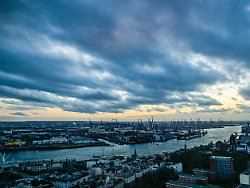Exploding energy prices, fragile supply chains, scarcity of raw materials: problems that have not been known for a long time are slowing the upswing. Germany as the economic engine of the EU? New brake pads hinder the journey. The question is: how long?
Boom. Out of the Corona Valley at full speed! This is how it should be. Pre-crisis level? That had been expected for a long time at the latest for the coming year. Above all, the catch-up effects should fix it. Once most of the Corona measures were withdrawn, the economy would be running like clockwork again.
Not at all! A whole series of surprising problems are increasingly destroying the hope of popping champagne corks. How the brake pads can be released quickly is unclear. An explosive mixture of challenges is emerging that requires the new government to have a particularly high level of economic expertise.
Rising energy prices: The costs for gas and oil are exploding – which makes not only heating but all products that have to be processed more expensive. The stores are less full than in previous years. And because the production facilities have recently started up again, demand increases. That leads to rising prices. In addition, industrial companies have to buy pollution rights when they shoot greenhouse gases into the air. They are also becoming more expensive. As a result of the EU’s climate protection policy, Brussels will significantly reduce the number of these certificates in the coming years. Companies are therefore already stocking up, which also pushes prices up. Nuclear power from Germany is not an alternative. In the coming year, the last German nuclear power plants will be taken off the grid. New supply gaps arise.
Green electricity: That is also in short supply. Due to the weather, wind and solar power plants produce less energy than hoped. The situation will only relax again when there are more opportunities to produce green electricity – which is politically desirable. How long it will take? Not clear. Because Germany does not have enough wind and solar power plants to cover its electricity needs, additional purchases have to be made. From Saudi Arabia, for example, where huge photovoltaic and wind power plants are currently being built. The Saudis are already rubbing their hands together and are working on solutions to convert the electricity into hydrogen and ammonia in order to then export it. New dependencies threaten.
Shortage of raw materials: Car manufacturers in particular – Germany’s model industry – suffer from an acute shortage of semiconductors. The result: production plants come to a standstill. Delivery times are getting longer. Some auto bosses are exercising optimism and want to see an easing of the situation in the coming months. But will that happen? Open minded. So far there are no reliable indications that the semiconductor crisis will be resolved quickly.
Fragile supply chains: When a transverse container ship in the Suez Canal brought world trade to a standstill in March, it looked like a one-off farce. The canal has long been passable again. The supply problems, however, persist. Due to the worldwide hunger for consumption after the pandemic, free containers are currently in short supply. Freight ports are overwhelmed with unloading the jammed ships. It can already be seen that the selection of Christmas gifts is likely to be narrower this year.
Germany’s companies are still holding back with lamentations. That wouldn’t help anyway: They would be understood as a claused profit warning. In difficult times, confidence is important. Also on the fact that politics creates convincing framework conditions to make the cluster risks manageable. So far they are not really recognizable. Here too, optimism is required.
